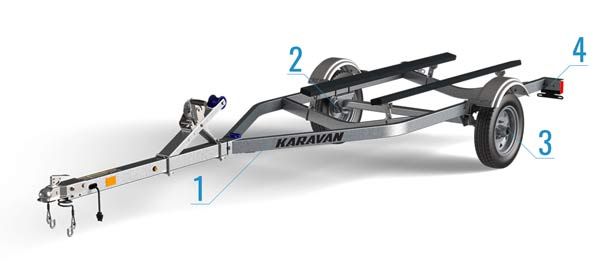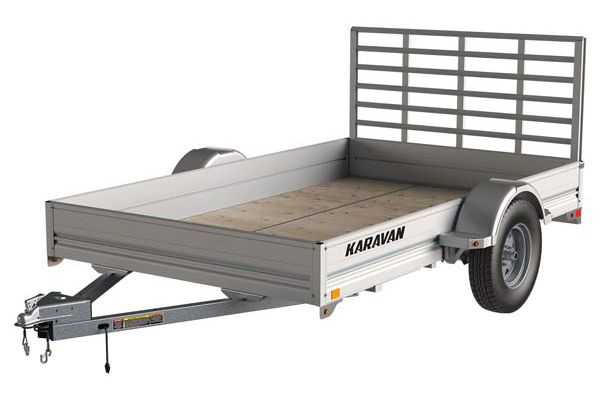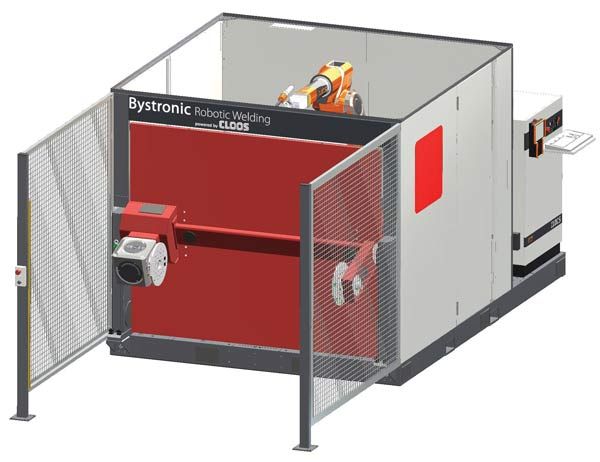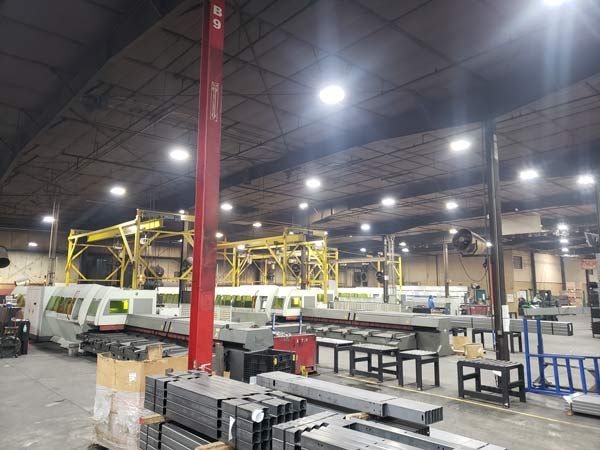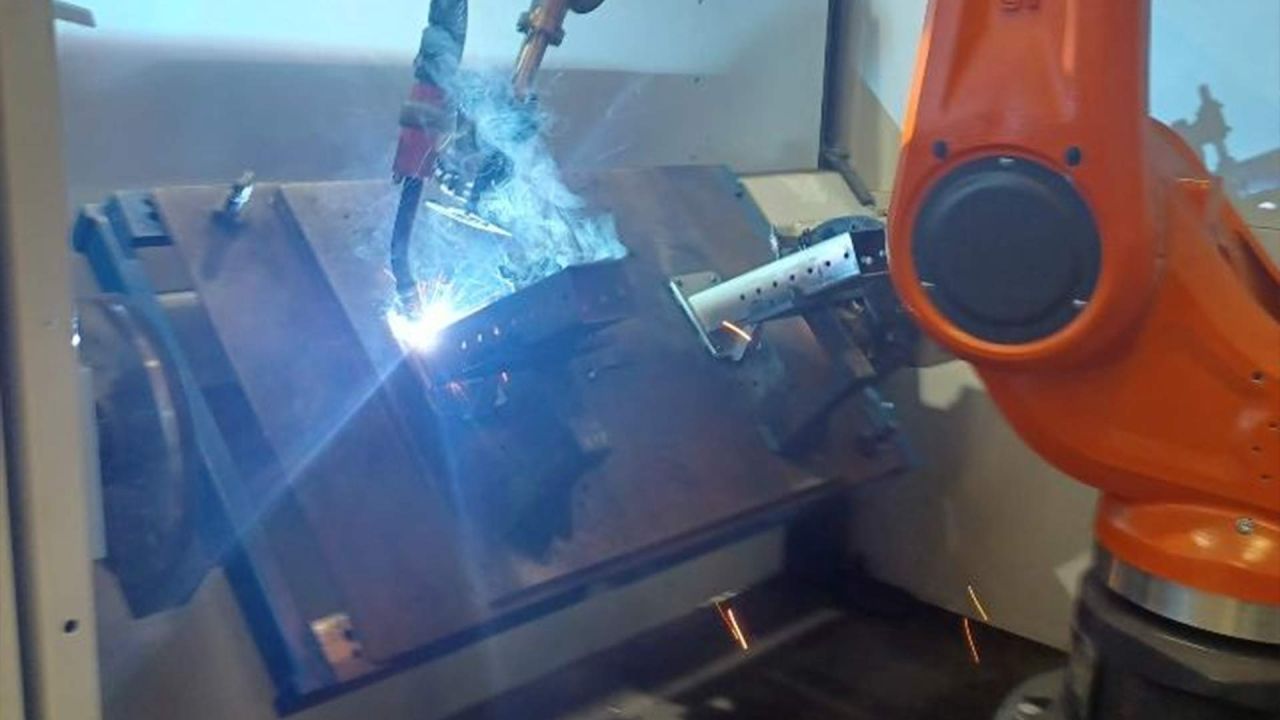
News No. 1 and growing
In 1986, when brothers Mike and Scott Boyd founded Karavan Trailers, they probably didn’t assume they would become the No. 1 independent boat trailer manufacturer in North America, but that is exactly what happened. As it turned out, they also became the supplier of choice to the No. 1 ranked boat manufacturer, the No. 1 ranked personal watercraft manufacturer as well as the No. 1 ranked home improvement retailer.
It shouldn’t come as a huge surprise, though. When the company was founded in Hartford, Wis., nearly 40 years ago, the brothers were incredibly strategic in their plans for how to grow the business. With early goals to create high-quality products, establish smart logistical partnerships and cultivate a strong company culture, broad success was in the cards.
Today, Karavan boasts several patents and more than 250,000 sq. ft. of production facilities and operations in Wisconsin, Missouri and Mexico, which is supported by cutting-edge equipment, a new fleet of semi-trucks and some of the best people in the industry.
“We don’t take people for granted; we always want to grow together,” says Mike Stelter, director of fabrication and welding at Karavan. “That’s a nice goal, of course, but it doesn’t always work out. When some companies get to a certain size, they lose that family feel where people just become numbers. But that just wouldn’t work here; it’s the people that make our products so unique.”
Founding principles
Stelter has been part of the Karavan family since 2000 – for more than half of the overall time the company has been in business. Right out of the gate, he was committed to the vision that the two founding brothers had set out for the company. Scott Boyd, in particular, instilled a major sense of pride in Stelter for the work he and the Karavan team would be involved in.
“He’s the kind of guy you would find down on the floor helping out, even putting on a welding helmet if you needed a hand,” he says. “So, we all rallied behind what he believed in. In all my years here, I have so much pride in what we do. We produce such a great product, and a lot of that has to do with the family feel he established here.”
Recently, Karavan was acquired by Southlake Equity Group. Southlake is well known in the trailer industry, especially the utility trailer space. The change in ownership did not, however, change the culture. A key objective of the owners is further cultivating the culture within the walls of Karavan, focusing on the employees and their ideas as well as showing appreciation.
“The nice thing about our product is that we totally control the design,” Stelter says. “Everything in our plant is designed 100 percent by us and made 100 percent by us. We can do that because we have the best people and the best equipment available. That’s what got us ahead when a lot of companies weren’t ready for those types of investments.”
With a fleet of cutting-edge sheet and tube lasers, robotic welders, stamping presses, press brakes and powder coating assets, Karavan produces its high-end trailer frames and parts in its Fox Lake, Wis., manufacturing facility and ships them to its sister facilities in Mexico and Missouri to be assembled.
“Establishing partnerships with blue-chip boat manufacturers and then opening plants near or even within their locations was a unique strategy that’s worked well for us – and them,” Stelter says. “They don’t have to warehouse their boats because our trailers are being built and brought to them on a daily basis.”
Deft deployment
Attaining supplier-of-choice status from companies like Brunswick Corp., a global leader in recreational boat sales, doesn’t happen from plant location alone, though. Karavan’s prestigious status is primarily rooted in the quality it consistently delivers to its partners.
“You have to remember the main purpose of our product,” Stelter says. “Our trailers are on the road in five-lane traffic with 24-ft. boats loaded onto them. There’s a lot that has to go into the manufacturing to ensure the safety of these products. If one tire blows or one part breaks, there could be some serious incidents.”
A new piece of equipment that is helping Karavan maintain its consistent quality is the company’s new Bystronic robotic welding cell powered by Cloos, a German company with 100 years of manufacturing experience. The cell is described as a customized “ready to weld” solution that offers an integrated rotary positioner, offline programming and an anti-collision sensor for the welding torch. Three models are available, depending on the size and weight of the parts that customers need to produce.
“We heard about the welding cell from one of our trusted equipment suppliers,” Stelter says. ““He told me that Cloos is a welding company, first and foremost, and they have engineered their own software and hardware and manufacture the entire product in-house. That’s rare to find, and that’s what really sold us on them.
“Because everything is done under one roof, I can call just one guy, who can talk to the IT person in the cubicle next to him if I need technical support, which is so nice,” he adds.
“Having it all under one roof also helps the price point stay lower than some of the other solutions on the market.”
In addition to its competitive price point, Stelter is quite pleased with how easy it’s been to deploy the cell since its installation four months ago. He says that one of Karavan’s employees was able to program 100 percent of the company’s products with only five days of training.
“The guy who completed the five-day training is already training new staff on it,” Stelter says. “And honestly, that could be almost anyone who just walked in the door with no skills. We can place them on the Cloos with no problems. Our younger staff get really excited about it, too. It gives them an opportunity to get their foot in the door and learn new things.”
Sold by Bystronic, the robotic welder adds to what Stelter describes as “a lot of other common robotic products.” So while Karavan already had experience in automated welding, the new system is a welcomed upgrade. Thanks to its rotating carousel and longer arm, it’s easier to get into hard-to-reach welding areas.
Furthermore, Stelter says that the welding cell is saving the company on consumable costs. Since its installation, he’s noticed that welding tips and liners seem to hold up longer, which he attributes to the robust software and overall product design.
“Since we’ve had it, we haven’t had any issues,” he says. “We’ve had zero downtime, so I haven’t had to reach out to anyone. I was blown away with what they were able to do for us in five days. It’s so easy to use, so I don’t go to bed anymore worried about what we’re going to do for staffing. It’s a good feeling.”
Future goals
To date, Karavan has patented trailers and trailer components that have taken the United States by storm, achieved No. 1 status in a slew of categories and earned the business of some of the biggest brands on the market. But as Stelter reminds, that’s just on the marine side.
“Now we’re looking at the utility side,” he says. “We patented a utility trailer that is going to propel us to No. 1 in that arena. And for our 2023 utility trailer line reviews, we designed 27 brand-new trailers, in three weeks. We’re pretty good at what we do here.”
In terms of Karavan’s reliance on automated welding going forward, Stelter says robots will be employed for high-volume needs while the company’s manual welders can focus on customer service parts and anything that’s too big to fit onto the Cloos, although he hopes to add larger welding cells from Cloos into the company’s equipment mix. In doing so, he says that future products can be designed around their capabilities.
“We’re going to be able to deliver a lot more trailers at a lot less cost,” he says. “I believe in what we’re doing here. I go to work every day and while it can be challenging, it doesn’t feel like work.”
By: Abbe Miller, editor-in-chief
As published in Welding Productivity Magazine
